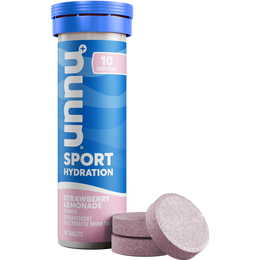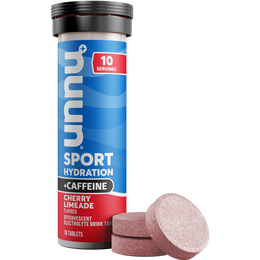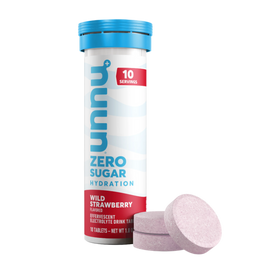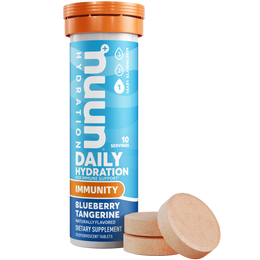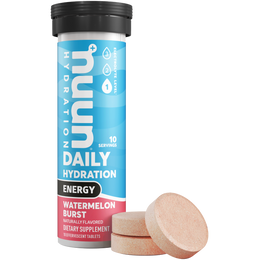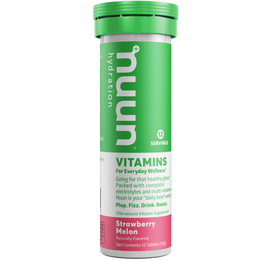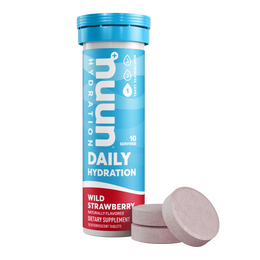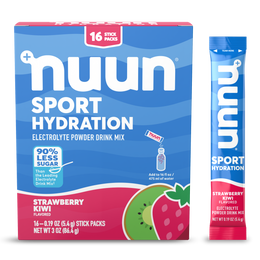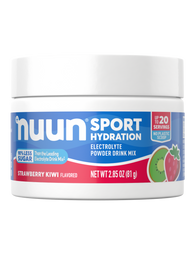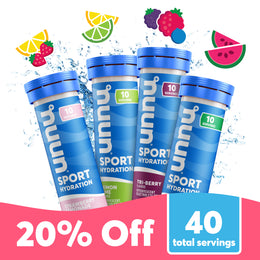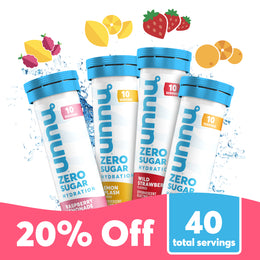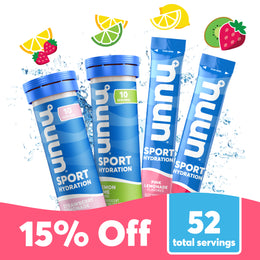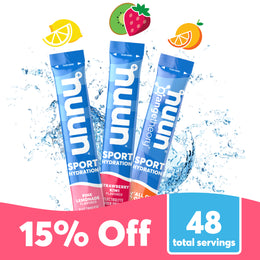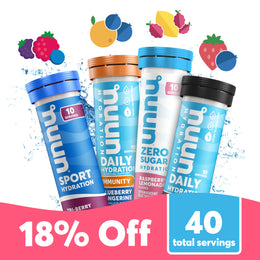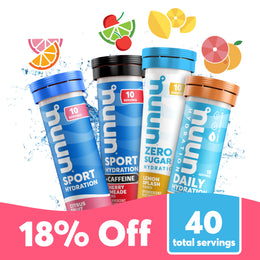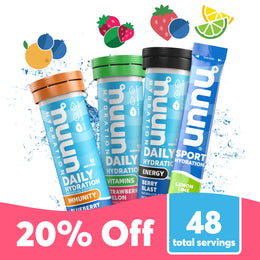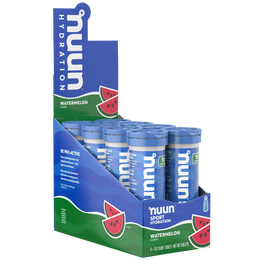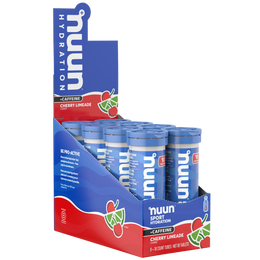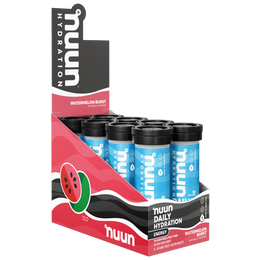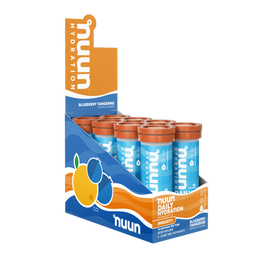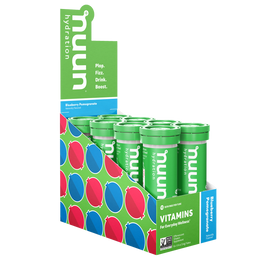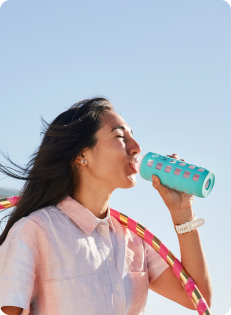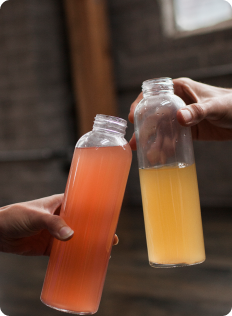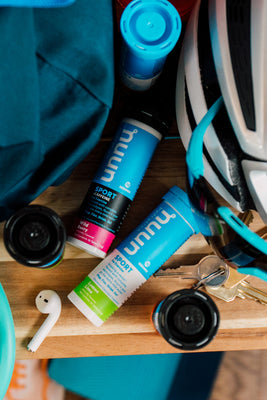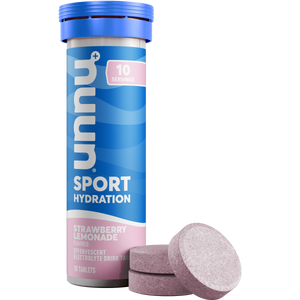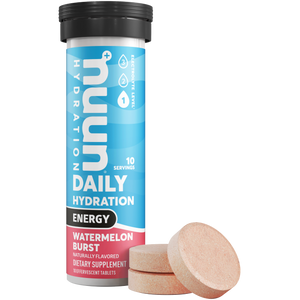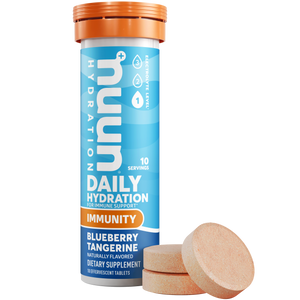Carbohydrates & Athletic Performance

By Vishal Patel
Chief Nutritionist at Nuun Hydration
Carbohydrates play key roles in sports performance, specifically for hydration and fueling with several studies proving this theory over the years (1,2). Carbohydrates can help fuel your muscles and enhance the delivery of fluids and nutrients (5). It is widely known that when exercising at a higher intensity and/or longer durations, your body will start using other (stored) fuel sources (carbohydrates) to help maintain performance. When the body begins to deplete its stored muscle and liver glycogen – fatigue (or bonking) can set in. That is where carbohydrates via fluids and external food sources (bars, gels, chews) come in handy. They can provide your body with the calories it needs, as well as, increase the rate of nutrient delivery (5,18).
Carbohydrates for hydration
In hydration, carbohydrates play key roles in fluid and nutrient delivery and absorption (5). The concentration and makeup of the solution you’re consuming can play a vital role in how your body will oxidize (utilize) the carbohydrates and electrolytes you are consuming (7). Nuun Endurance is a powder drink mix that contains a blend of performance based carbohydrates + electrolytes. The product is formulated to help increase gastric emptying (rate of nutrient delivery) by its hypotonic (<6% CHO concentration) solution characterization (7,8,9).
Products that are overly concentrated with carbohydrates often utilize only a singular absorption pathway, leaving residual carbohydrates floating within your plasma. This has been known to cause gastrointestinal issues (GI) and stomach issues (7,10). When you consume overly concentrated sports drinks, you are essentially creating waste. With the high(er) amount of CHO’s your body can get overwhelmed by what it's given at that moment – that’s when bloating and sloshing of fluids come into play. What’s causing that is the high carbohydrate concentration.
Carbohydrates for fueling
In fueling, carbohydrates also play important roles. As mentioned earlier, when exercising at a higher intensity the body will begin relying on carbohydrates more for fuel (and some fat) (1,2). Therefore, your body will depend on your glycogen (stored form of carbohydrates) stores for fuel. Stored glycogen is primarily located within liver and muscle tissue. When you give your body the nutrients (carbohydrates) it needs at those higher intensities, you spare glycogen. Those CHO’s you’re taking in will help keep your blood sugar constant, and help maximize exercise performance (17,18,20).
Carbohydrates in Nuun Endurance
Nuun Endurance uses multiple carbohydrates sources to help your body utilize several absorption pathways, helping increase the efficiency of what you are consuming (5,6,7). Consuming multiple sources of carbohydrates will also help your body oxidize more carbohydrates resulting in faster more effective hydration (6,7). Consuming these additional sources of carbohydrates will also decrease the onset of fatigue, and gastrointestinal issues (GI) (5).
Each serving of Nuun Endurance contains 16g of hard-working carbohydrates and optimized electrolytes for exceptional absorption. Whenever you're working out for 90 minutes or more, add a scoop to your water bottle to power your peak performance. The specialized formula will keep you hydrated and in it for the long haul.
Additional resources
1. Clark, N. (2008). Sports Nutrition Guidebook. (4 Ed., Pp.183-185). Champaign, IL: Human Kinetics2. Jeukendrup AE. (2004): Carbohydrate Intake During Exercise and Performance, Journal Of Nutrition, 20:669-677.
3. Coyle Ef, Hagberg Jm, Jurley Bf, Et Al. (1983). Carbohydrate Feeding During Prolonged Strenuous Exercise. J Appl Physiol. 55:230-5
4. Coggan Ar, Coyle Ef. (1987). Reversal of Fatigue During Prolonged Exercise By Carbohydrate Infusion Or Ingestion. J Appl Physiol. 63:2388-95.
5. Jeukendrup A. (2013). Multiple Transportable Carbohydrates and Their Benefits. Sports Science Exchange. 108:1-5.
6. Coombes Js, Hamilton Kl. (2000). The Effectiveness of Commercially Available Sports Drinks. Sports Medicine. 29:181.
7. Leiper Jb. (1998). Intestinal Water Absorption – Implications for The Formulation Of Rehydration Solutions. Int. J. Sports Med. 19:S129-132.
8. Leiper Jb. (2001). Gastric Emptying and Intestinal Absorption Of Fluids, Carbohydrates, And Electrolytes. Crc Press. 89-128.
9. Maughan Rj. (1998). The Sports Drink as a Functional Food: Formulations For Successful Performance. Proc. Nutr. Society. 57:15-23.
10. Morton Dp, Aragon Lf, Callister R. (2004). Effect of Ingested Fluid Composition On Exercise-Related Transient Abdominal Pain. Int J. Sport Nutr. Exerc. Met. 14:197-208.
11. Appleton Km. (2005). Changes in The Perceived Pleasantness Of Fluids Before And After Fluid Loss Through Exercise: A Demonstration Of The Association Between Perceived Pleasantness And Physiological Usefulness In Every Day Life. Physiol. Behavioral. 83:813-819.
12. Maughan Rj, Leiper Jb. (1999). Limitations to Fluid Replacement During Exercise. Can J. Appl. Physio. 24:173-187.
13. Jeukendrup Ae. (2004) Carbohydrate Intake and Exercise Performance.
14. Fielding Ra, Costill Dl, Fink Wj, Et Al. Effect of Carbohydrate Feeding Frequencies And Dosage On Muscle Glycogen Use During Exercise. Med Sci Sports Exerc. 1985;17:472–6
15. Jeukendrup Ae, Jentjens R. Oxidation of Carbohydrate Feedings During Prolonged Exercise: Current Thoughts, Guidelines And Directions For Future Research. Sports Med. 2000;29:407–24.
16. Jentjens Rl, Moseley L, Waring Rh, Et Al. Oxidation of Combined Ingestion Of Glucose And Fructose During Exercise. J Appl Physiol. 2004;96:1277–84
17. Pfeiffer B, Stellingwerff T, Zaltas E, Et Al. Cho Oxidation from a CHO Gel Compared With A Drink During Exercise. Med Sci Sports Exerc. 2010;42:2038–45
18. Pfeiffer B, Stellingwerff T, Zaltas E, Et Al. Oxidation of Solid Versus Liquid CHO Sources During Exercise. Med Sci Sports Exerc. 2010;42:2030–7
19. Jeukendrup A. (2014). A Step Towards Personalized Sports Nutrition: Carbohydrate Intake During Exercise. Sports Medicine. Suppl 1: S25-S33.
20. Jeukendrup Ae, Mensink M, Saris Wh, Et Al. Exogenous Glucose Oxidation During Exercise In Endurance-Trained And Untrained Subjects. J Appl Physiol. 1997;82:835–40
21. Van Loon Lj, Jeukendrup Ae, Saris Wh, Et Al. Effect of Training Status On Fuel Selection During Submaximal Exercise With Glucose Ingestion. J Appl Physiol. 1999;87:1413–20.
22. Van Loon Lj, Greenhaff Pl, Constantin-Teodosiu D, Et Al. The Effects Of Increasing Exercise Intensity On Muscle Fuel Utilisation In Humans. J Physiol. 2001;536:295–304.
23. Sawka Mn, Burke Lm, Eichner Er, American College Of Sports Medicine Position Stand, Et Al. Exercise And Fluid Replacement. Med Sci Sports Exerc. 2007;39:377–90
